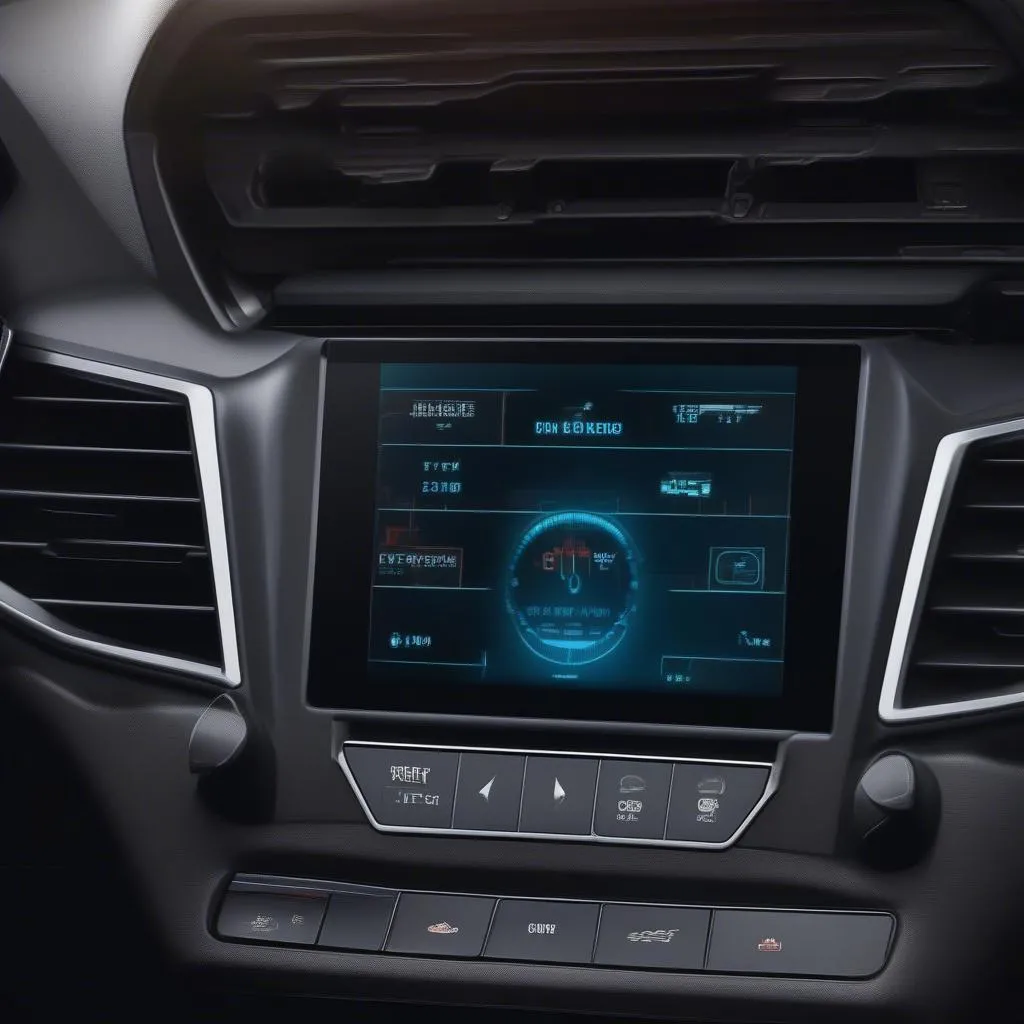The AdBlue warning light on your VW Transporter can be a frustrating issue, but understanding its causes and solutions can help you get back on the road quickly. This guide covers everything you need to know about the AdBlue warning light, from common causes to effective solutions and resetting the warning light itself.
What is AdBlue and Why Does It Matter?
AdBlue is a solution of urea and deionized water that helps reduce harmful nitrogen oxides (NOx) emissions from diesel engines. It works by injecting the solution into the exhaust system, where it converts NOx into harmless nitrogen, water, and carbon dioxide. The AdBlue system is essential for modern diesel vehicles to meet strict emission regulations.
When your AdBlue system malfunctions, the warning light will illuminate on your dashboard. This could be due to several factors, such as low AdBlue fluid levels, a faulty sensor, or a blockage in the system.
Common Causes of the VW Transporter AdBlue Warning Light
The AdBlue warning light in your VW Transporter could be triggered by several reasons, including:
- Low AdBlue Fluid Level: The most common reason is simply running low on AdBlue. The warning light will usually come on when the AdBlue tank has about 2.5 liters remaining.
- Faulty AdBlue Sensor: A faulty sensor can lead to inaccurate readings, triggering the warning light even if the AdBlue level is sufficient.
- AdBlue System Blockage: The AdBlue system can become blocked due to various reasons, such as frozen fluid, contamination, or a clogged filter.
- AdBlue Pump Malfunction: A failing AdBlue pump can prevent the fluid from being injected into the exhaust system, resulting in the warning light.
- AdBlue Injection System Issues: Problems with the AdBlue injectors can lead to a malfunctioning system and trigger the warning light.
What to Do When the AdBlue Warning Light Comes On
If the AdBlue warning light appears on your VW Transporter, take the following steps:
- Check the AdBlue Level: First, check the AdBlue fluid level in your vehicle’s tank. You can usually find a dipstick or a gauge to indicate the remaining fluid.
- Top Up the AdBlue: If the level is low, add more AdBlue to the tank. You can purchase AdBlue at most gas stations and auto parts stores. Make sure to use only approved AdBlue fluid, as other fluids can damage the system.
- Check for Leaks: Inspect the AdBlue tank and lines for any leaks, as these can contribute to the low AdBlue level.
- Consult the Owner’s Manual: Refer to your VW Transporter’s owner’s manual for specific instructions on troubleshooting the AdBlue system and resetting the warning light.
- Seek Professional Help: If you can’t identify the issue or resolve it yourself, take your vehicle to a qualified mechanic who specializes in VW Transporter AdBlue systems.
Resetting the AdBlue Warning Light
Resetting the AdBlue warning light after addressing the underlying issue is often necessary. Here’s how to do it:
- Turn the ignition key to the “ON” position, but don’t start the engine.
- Press the accelerator pedal to the floor and hold it down for 10 seconds.
- Release the accelerator pedal.
- Start the engine and allow it to run for a few minutes.
Important Note: This process may vary depending on the year and model of your VW Transporter. Always consult your owner’s manual for the specific instructions for your vehicle.
Expert Insight: “It’s crucial to address the root cause of the AdBlue warning light rather than just resetting it. Ignoring the warning light can lead to further complications and potential damage to your VW Transporter’s emission system,” says [Expert Name], a leading automotive technician specializing in VW Transporter AdBlue systems.
How to Prevent Future AdBlue Issues
Taking steps to prevent future AdBlue warning light issues can save you time and hassle:
- Regular AdBlue Maintenance: Regularly check the AdBlue fluid level and refill as needed.
- Use High-Quality AdBlue: Use only approved AdBlue fluid, as other fluids can damage the system.
- Protect the AdBlue Tank: Avoid storing the vehicle in extreme temperatures, as this can affect the AdBlue fluid’s properties.
- Perform Regular Inspections: Inspect the AdBlue tank and lines for any leaks or blockages.
FAQ
Q: Can I drive my VW Transporter with the AdBlue warning light on?
A: Yes, but only for a limited distance. Driving with a low AdBlue level or a malfunctioning system can cause engine performance issues and may result in the vehicle entering “limp-home mode.” It’s best to address the problem as soon as possible.
Q: Is it safe to use AdBlue from different manufacturers?
A: No, it’s not safe. Only use approved AdBlue fluid, as other fluids can damage the AdBlue system.
Q: Can I just ignore the AdBlue warning light?
A: No, ignoring the AdBlue warning light can lead to further complications and may even result in your vehicle failing emissions testing.
Q: How much does it cost to fix an AdBlue system issue?
A: The cost of fixing an AdBlue system issue can vary depending on the cause and the severity of the problem. It’s always best to get a quote from a qualified mechanic before proceeding with any repairs.
Q: How often should I refill my AdBlue tank?
A: The frequency of AdBlue refills depends on your driving habits and the size of your tank. Typically, you’ll need to refill the tank every 500-1000 miles.
Q: What happens if my AdBlue system fails completely?
A: If your AdBlue system fails completely, your vehicle may not be able to start or may enter “limp-home mode.” You’ll need to have the system repaired as soon as possible.
Understanding the AdBlue system and its potential issues is essential for all VW Transporter owners. By following the tips and information provided in this guide, you can help ensure your vehicle’s AdBlue system operates efficiently and reliably. If you encounter any persistent problems, consult with a qualified mechanic who specializes in VW Transporter AdBlue systems for expert assistance.


